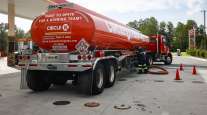Fleets Plan More Leasing, Alt-Fuel Use, Survey Shows
This story appears in the July 7 print edition of Transport Topics.
About a quarter of companies expect to increase the size of their fleets in the next 12 months, with leasing being the most popular choice for obtaining new vehicles, according to a recently released survey by GE Capital.
And about half of companies with vehicle fleets expect fleet costs to increase this year while a few expect them to decline, according to GE’s Fleet Market Economic Outlook released late last month.
Costs will rise in part due to higher fleet capitalization expenses, said Steve Jastrow, GE Capital Fleet Services’ strategic consulting manager.
“These costs go up roughly 1% to 3% per year per vehicle [and] will be one of the biggest drivers of fleet cost increases,” he told Transport Topics.
“Fuel likely will not be a factor [because] fuel efficiency gains on newer vehicles coupled with flat fuel prices help this out,” Jastrow added. “Many of our customers who are using telematics are seeing fewer miles driven through more efficient routing and other strategies driven by advanced analytics.”The survey said fleets’ largest cost increases in the past year were for fuel and maintenance — especially the upkeep of older vehicles and unscheduled repairs.
The outlook surveyed more than 400 executives at middle-market companies in diverse fields, ranging from $10 million to $1 billion in revenue, with responsibility for their company’s fleets.
Executives surveyed represented the trucking, automotive, retail, construction, health care, food and beverage, commercial aerospace and telecommunications industries. The average revenue of those firms that operate fleets was just over $191 million, while the average number of employees was about 1,500.
The most popular mode of obtaining new vehicles was leasing, which was cited by 30% of respondents. That was slightly more than the 28% who reported using company cash on hand.
The primary objectives in fleet management were reducing maintenance costs and fuel costs, through right-sizing their fleets and introducing more alternative-fuel vehicles, the report said.
It found that while 4% of companies surveyed currently have alt-fuel vehicles in their fleet, nearly half plan on adding them in the coming years. Of those, 64% plan on adding them in the next two years, while 92% will add them within the next five years, GE said.
“As companies look for ways to maintain margins, many are considering [alternative-fuel vehicles] to reduce the impact of rising fuel costs,” the report said. “With increasing fleet sizes, maintenance costs are also a major concern.”
Two-thirds of executives overseeing fleets said their firms saw improved overall performance, and almost 70% reported improved year-over-year financial performance.
Almost half the firms surveyed said workers will be added in the coming year, with employment at those firms expected to grow by an average 3% year-over-year, the survey said.
Almost half (45%) of the companies surveyed were extremely or very confident in their local economies, with another 38% somewhat confident. For the U.S. economy, 28% were very confident and another 37% were somewhat confident, while 21% were very confident in the global economy with another 42% somewhat confident.
As a result of a stronger economic outlook, 42% of executives expect their firms to post higher profit margins in the coming year, and two-thirds of executives overseeing vehicle fleets indicated their firms saw improved performance from a year ago.
About 40% said their capital expenditures will be greater in 2014 than last year. The same percentage was considering equipment financing, while a lower percentage, 25%, was considering financing for its general fleet needs.




